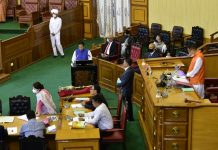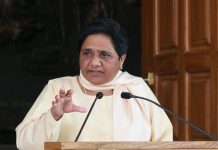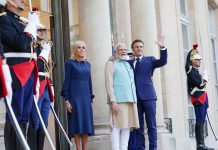
Narendra Modi is no longer the elephant in the room. He is the lion (from the Gir sanctuary in Gujarat, if you please) lording the jungle already, all but named its king. A receptacle of the hopes of a billion-plus nation, the messiah that everyone — the industrialist, the economist, the analyst, the nationalist, the jingoist, the optimist, the Hindu (of course), and, we are now told, even the Muslim — believes is just paces from seizing charge of this potentially great nation and shaping for it a destiny it deserves.
Or so runs the boilerplate. The BJP’s most incandescent poster boy since Lal Krishna Advani rode out into the sunset in 2009, Modi got four back-to-back chances at the lectern since last weekend to lay out his agenda, vision and programme of action for running India. All four of his speeches — including one at the “ladies” wing of the business chamber, FICCI, and another to (mostly non-Bengali) businessmen in Kolkata — became a sensation. Delighting his red meat base, Modi’s televised speeches were an imprimatur of his wishful ascension as India’s next prime minister after the 16th General Election that is due in a year, but some believe may even be called earlier.
Undoubtedly that last uncertainty is now informing Modi’s political strategy towards realising his goal. He has too much to pack to sell and too little time to run his campaign. Although clearly the most popular BJP leader in the country today, it is an open secret that he needs to constantly look over his shoulder to forestall an insurgency towards a factional coup, which isn’t all that unlikely given that Modi’s rise would decimate a generation of BJP leaders that has nursed ambitions for decades. Needing to fully use the little time that is left until the 2014 Lok Sabha election, Modi may well have already kicked off his campaign. His speechifying is only likely to increase.
But Modi is hampered not only by the paucity of time but also the messaging. His central pitch foregrounded in his four speeches during 6-9 April — in Ahmedabad, New Delhi and Kolkata — is this: I have run a flawless administration in Gujarat for 11-plus years. I have made everything incredibly better there since I became chief minister in 2001. Look at my initiatives across government, business and the social sector. The growth in Gujarat is unparalleled. The change is revolutionary because my ideas are. I’m modern and progressive and, importantly, an outlier who isn’t driven by political gamesmanship. Gujarat is a template for the nation. Ergo, I should be prime minister.
Not since VP Singh in 1987-89 has a politician (barring Advani in 2009) so categorically pitched himself as a front-runner. But Singh got a solid two-plus years for his campaign. And that dream run was gifted on a platter as then prime minister Rajiv Gandhi sank deeper and deeper in popular perception over his alleged role in the bribes a Swedish arms company, Bofors, paid to secure a sale to the Indian Army. By the time the 1989 Lok Sabha election arrived, Singh’s aura was such that nearly the entire non-Congress Opposition across India, including stalwarts such as NT Rama Rao from Andhra Pradesh, had banded behind Singh as he battled Gandhi’s Goliath.










